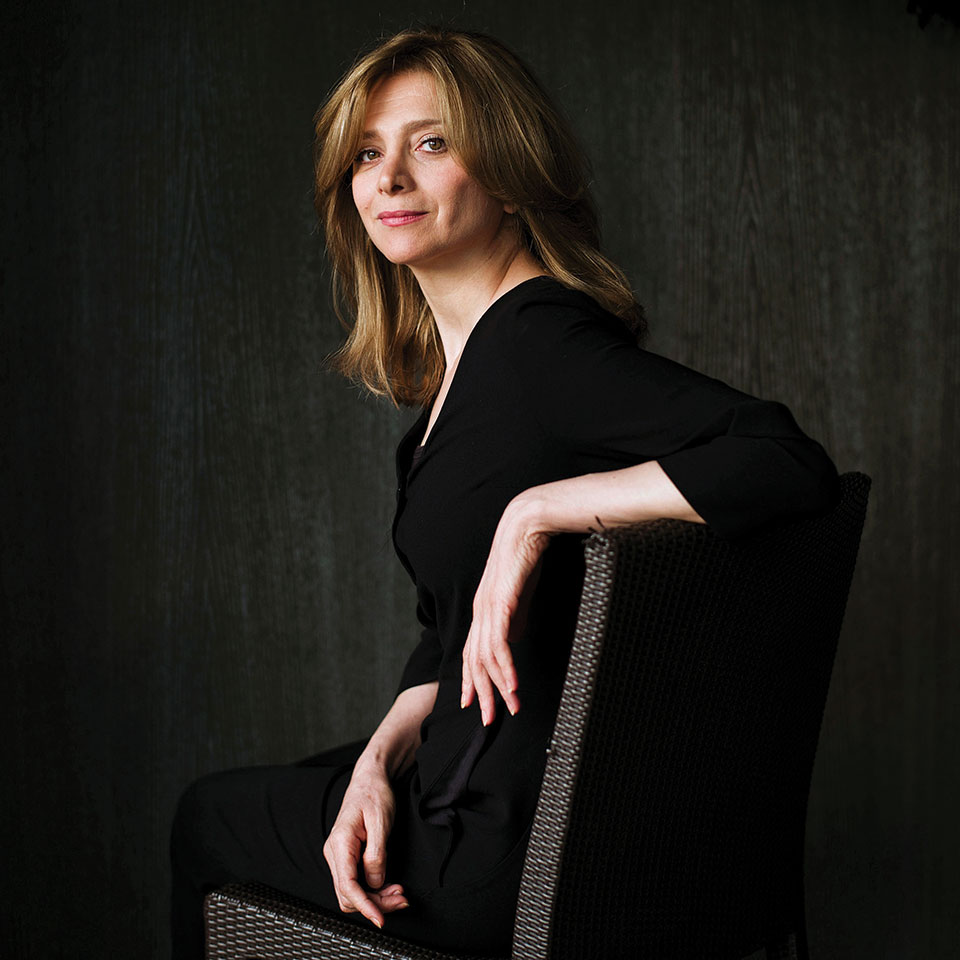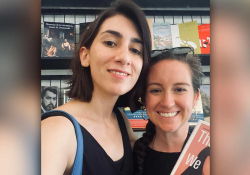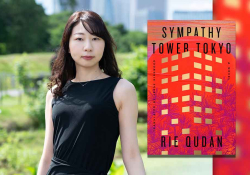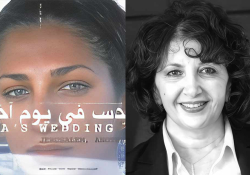“The Most Important Way to Love and Peace Is Justice”: A Conversation with Samar Yazbek

In March 2011, after peaceful protests began to emerge across Syria, pushing for government reform, Samar Yazbek witnessed what was a passive, civil uprising become an unthinkable war. Fearing for her safety as a journalist, Yazbek fled to Paris, where she’s lived in exile ever since. She made the perilous crossing into Syria from the Turkish border three times, until 2013, which marked the last time she saw her country. Interviewing the locals in the heart of the most ravaged areas of Syria, Yazbek was compelled to gather the people’s stories, from mothers of martyrs to secular fighters. The voices of these men and women, who are fighting for their freedom and lives every day under the attacks from the regime and radical occupation, would not have been heard without Yazbek’s efforts to collect them. It wasn’t until 2014, after struggling to process the brutality she’d witnessed, that she was able to put it to paper. The result is The Crossing: My Journey to the Shattered Heart of Syria, which has been called one of the first political classics of the twenty-first century.
This interview took place in May 2016 in a café in Paris. I spotted Yazbek, who was waiting outside with a cigarette, under a floppy black hat. After our interview, she asked in Arabic to hear the story of our interpreter, who, like Yazbek, has witnessed the Syrian conflict with her own eyes. Although Yazbek is cautious about spilling too much personal information, in many ways she reflected the women in her book: humble, clear, and open.
Stephanie Papa: Could you tell us what your life was like in Syria, before the revolution broke out?
Samar Yazbek: Before the uprising began, I was a writer and journalist. I wrote scripts for TV and cinema; I worked for local magazines. I was a women’s rights activist, and still am.
Stephan Papa: Your book, The Crossing, is an account of the harrowing experiences you witnessed after three crossings over the border of Turkey into war-torn Syria. Instead of writing a novel upon your return, you felt compelled to recount the true stories you heard. Many of the people you met begged you to recount their suffering and perseverance. One woman asked you, “Do you promise to write down everything I told you?” Are you writing for these people who entrusted you with their stories?
Samar Yazbek: The Crossing is a documentation of what people were going through every day, true events that I wrote in the style of a story, not as a journalist. I didn’t write it for the people who told me their stories, because most of them are dead. The people who are still alive can barely afford to eat, so the book is not for them. I’m writing for the whole world to see what the people of Syria experience on a daily basis. I wanted to convey the voices of these victims to the world. It’s the role of the educated Syrian elite—writers, artists—to engage in this situation, to take part in social justice.
Stephanie Papa: Your account of the events in Syria shows a side of the conflict that many are widely unaware of. Since March 2011, Assad’s regime has attacked and murdered Syria’s own people. The sky never ceases to shake with bombs. You even interviewed an emir of a jihadist group, who like many other fighters you encountered wanted to kill all Alawites, your family’s sect. Now in 2016, the war rages on, the regime hasn’t relented, and conflict continues between sects and radicals. Syria has endured this brutal state of emergency for five years. What has changed for you since your last crossing?
Samar Yazbek: First, I lost faith in the international community. Each country prioritizes its own interest and completely ignores the massive extermination of the Syrian people. They forget humanitarian values and preserve their own interests over the suffering Syrians. What has also changed is that the Syria we used to know doesn’t exist today. It’s no longer even a failed state. It’s much more than that: it’s a destroyed nation. Since the radicals arrived, the national uprising has almost died out, and it has become a war. Yet some people of the civil revolution are still fighting what they had started, persevering for our dreams, democracy, and unity. When the uprising began, everyone wanted unity, yet the media and international community ignored this call for democracy. The Muslim people were standing up against extremism and the regime since the beginning; it started as a peaceful demonstration. Even today, despite all these changes, I still work on the same civil principles I started with.
The Syria we used to know doesn’t exist today. It’s no longer even a failed state. It’s much more than that: it’s a destroyed nation. Since the radicals arrived, the national uprising has almost died out, and it has become a war.
Stephanie Papa: Is the Western media responsible for focusing on ISIS as the most violent offenders, when Assad’s regime has killed scores of people daily, leaving the country in a state of grave emergency?
Samar Yazbek: Yes, the international media has a large role in orienting public opinion, presenting the conflict as one between ISIS and the regime, and totally forgetting the people who are against both. These people are the real victims today, and they started the uprising in the first place. The media is doing so for its own benefit, or to satisfy their governments’ political interests. I used to write for a prestigious newspaper in 2012, and in 2013, when I started explaining what was happening, the violence of the regime, it stopped publishing me. It created a new monster: ISIS.
Stephanie Papa: I am particularly fascinated by the women in your accounts of Syria. They are generous and brave, with wisdom in their eyes. What have you learned from these women? Why were the women and children of Syria so important to you?
Samar Yazbek: First of all, the places I visited were all high-conflict zones, where the regime was bombarding from one end and the jihadists occupying from the other. So while men were fighting in these areas, the women were making lives. I often focused on them, because they were the ones making life continue everywhere. It’s important to highlight that earlier on in the uprising, women had a very important role in the revolution. Before the militarization, women were in the streets, and they were a vital part of the civil movement. Afterward, ISIS and other jihadists radicalized the uprising and took over most of the revolution, making women’s roles marginal. Their role in the movement disappeared, which is why I wanted to focus on them.
The more violence there is, the stronger the need you have to live. People know they could die any minute, so they are fully aware of life in every moment.
Stephanie Papa: How do you explain the stark juxtaposition in Syria between laughter and violence, the continuity of rituals and generosity, under a barrel-bombed sky?
Samar Yazbek: The more violence there is, the stronger the need you have to live. People know they could die any minute, so they are fully aware of life in every moment. The moments become more powerful, more precious. When you witness death every day, you start appreciating things in a deeper way; you start seeing life differently, details you would never notice otherwise. Survival becomes a lifestyle; you have to make a joke of death to get through it, almost like a game. You’re simply trying to survive with everyone else, and trying to help them. You only truly start suffering when you leave, and then you feel guilty because you survived.
Stephanie Papa: Is that why you mention in your epilogue that it took months to start writing about your experience?
Samar Yazbek: Yes. The book was five hundred pages. There were so many interviews to rewrite, so much material that I had to summarize many of the experiences. Going through them was one of the most difficult parts. People believe that writing about suffering and pain will liberate you, but actually it makes the suffering ingrained deeper within you, instead of setting you free. You don’t want to live with it anymore.
Stephanie Papa: So is writing about the affirmation of life instead of suffering a way to overcome this?
Samar Yazbek: That’s a part of it, yes.
Stephanie Papa: With the money from the Harold Pinter Prize, you set up some centers for women in Syria, which became Women Now for Development. There are thousands of women who benefit from these centers, despite being bombed multiple times by the regime. What is the current status of your association?
Samar Yazbek: I founded Women Now for Development in Paris when I was still going back and forth to Syria, until the end of 2013. It is a method to fight violence by establishing development centers in the conflict areas and to transform the violence into citizenship. Each center has a department to help women establish small businesses to sustain a living and develop such skills as teaching, technology, language, and writing. In these villages, the well-educated people have already left during the uprising, so the only ones left are poor and need access to education. These women are the most in need. Also, we’re encouraging women and children on all levels: empowerment, education, and therapeutic support. It started on a grassroots level; we didn’t have any funding from any government, and we relied on our own resources. Today, we’ve grown; we’re helping 7,000 women in refugee camps in Syria and Lebanon, and we have 167 employees. Now we’re supported by international NGOs who also focus on these issues. I work for the association as a volunteer.
Stephanie Papa: Is it important that these women have other women, especially writers or activists like you, as role models? For a woman in this context, is it important for them to see a hopeful future is possible?
Samar Yazbek: Well, men can help as well, of course! And there are so many other women like me in Syria. Just because I was a well-known writer before, the media may see me as an angle. The West always wants to make a hero of someone. But I’m not interested in PR; I don’t want that. I’m glad I escaped Syria, but there are so many women who are much greater than me. The least I can do is try to be a voice, but I’m against making heroes. That is a selfish act.
Stephanie Papa: You were often the only woman traveling with groups of men, who were hesitant that women be involved in a political discussion. Many wouldn’t even look you in the eye. In one incident, an ISIS fighter from abroad told you that the war was no place for a woman. What was your reaction to men who made you feel unwanted?
Samar Yazbek: Well yes, they tried to kick me out many times, but I wouldn’t listen.
Stephanie Papa: What is the Syrian writers’ community like now? Is the younger generation inspired to use writing or other artistic mediums in a time of war?
Samar Yazbek: There is a new generation of writers who were inspired by the revolution, who became activists and write for the media and other projects. There are also writers who never wanted to leave Syria and chose to stay despite the conflict. It’s too risky for them to write against the regime.
Stephanie Papa: You describe witnessing the kidnapping of journalist Martin Soder in a newsroom in Idlib. Then, on December 9, 2013, armed groups from the Islamist Front abducted four prominent Syrian human rights defenders, Razan Zaitouneh, Samira al-Khalil, Wael Hamada, and Nazem Hammadi. Did you have a relationship with these activists?
Samar Yazbek: I was there when Daesh came and took Martin. I know other friends who were kidnapped, and humane oppositionists who were kidnapped by radicals in Damascas, like Razan Zaitouneh. Razan is one of the leaders in the civil uprising, and she deserves to get recognition for this. She is one of the leading human rights activists who documented rights violations by the regime and radicals, which is why she was kidnapped. She was my partner in many civil rights projects. The second is Samira al-Khalil, who was also kidnapped by radicals. She is a prominent opponent of Assad and was jailed in the 1980s. We still don’t know anything about their whereabouts today.
Stephanie Papa: Do you yourself feel at risk now, even in exile?
Samar Yazbek: No. Whatever happens, happens. It’s important to note that acts against free speech started with the regime ruining the reputations of writers and activists. This was followed by Islamic radicals who echoed the same method and starting kidnapping. I want to point out a difference here between Muslim and Islamist. Islamism is not a form of the Muslim faith. Muslims can promote secular political and social values; anyone could be Muslim. But Islamists who came later are the radicals. Here, we’re talking about Islamic radicals.
Stephanie Papa: This is often misrepresented in Western media.
Samar Yazbek: Yes, it is. Violence creates violence. There was so much violence committed by the regime that it forced normally moderate people to join the radical groups, because they were the only ones there for them. When you’re sinking, you look for anyone who can hold your hand. This is how people have joined Nusra Front, ISIS, and other radicals, and how society in turn is radicalized. Yet one of the things that demonstrates how this radicalization in Syria is temporary is that earlier this year in February, when the cease-fire occurred, a few days later the citizens took to the streets again, ignited by the same spark as in 2011. Demonstrations were held, they took down the radicals’ flag, and they put up the Syrian revolution flag in favor of the civil revolution. This means that whatever you do, after all this destruction for five years, when the people are liberated, they will take to the streets again. That’s the beauty of it, and it doesn’t get any attention; it’s what the international media ignores. They talked about the cease-fire, but they didn’t say that as soon it began, people went back to the streets. They are so determined; they will not stop. They will never agree to accept Assad no matter what happens; look at what he’s done to them in the past five years, and they’re still fighting.
Stephanie Papa:The Crossing is filled with beautifully poetic images, despite the violence. Do you write poetry?
Samar Yazbek: Yes, but it’s very personal for me. I’ve never published anything. Maybe one day I will, maybe not.
So writing may be a way, but for these people, the most important way to love and peace is justice, to put those who committed war crimes behind bars.
Stephanie Papa: You quote a woman who stood with you in the graveyard of the martyrs of Saraqeb, saying, “All this death . . . it brings with it so much love.” What are your thoughts on this comment, the idea that hope can emerge from even the most inconceivable suffering? Can writing play a role in this?
Samar Yazbek: That’s part of it, yes. When you break down the evil and write about what happened, it might create love. Yet we are in a civil war, and unless there’s justice, this war will continue for years. So writing may be a way, but for these people, the most important way to love and peace is justice, to put those who committed war crimes behind bars.
Stephanie Papa: You seem to remain very hopeful in seeing the Syrians’ determination and fight for their freedom. Is that the hopeful way forward for Syria?
Samar Yazbek: We’re not in charge of our destiny. We aren’t the ones who decide to stop the war. It’s in the hands of those who are fighting. This is a proxy war between the regional and international powers. As soon as they decide to stop the bloodshed, we’re all willing to go back and rebuild the country. It’s not a war that we have a say in anymore. It’s controlled by the sponsors of the war, and the people’s opinion is ignored. The Assad regime was used as a tool to destroy the nation, yet that doesn’t mean he’s not a war criminal.
Stephanie Papa: The Aleppo Project based in Budapest, Hungary, is bringing researchers together to try to rebuild Aleppo, with the help of Aleppo locals, expatriates, and refugees. According to their studies, 72 percent of the refugees would return to Syria, under certain preconditions (Assad regime collapse, ISIS destroyed, security, food, jobs). Are you involved in these projects?
Samar Yazbek: No, not currently. There are many projects like this, but first and most importantly, the war needs to end.
Stephanie Papa: What have you been writing recently? What is your current project?
Samar Yazbek: I’ve been writing articles and busy with fieldwork, but now I’m doing the final touches on a novel, which is set to be released early next year.
Stephanie Papa: How can we help your association, Women Now for Development?
Samar Yazbek: You can donate online, or volunteer on-site if you have anything to offer to these women. You can also manage a project even if you are not ready to travel to the sites in person.
May 2016
Translation from the Arabic
By Emma Suleiman











